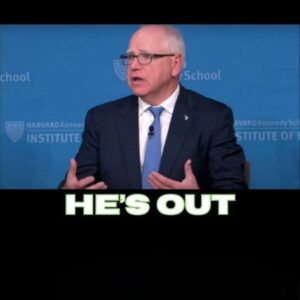PHOENIX, AZ — The dream of turning social media stardom into a congressional seat hit a harsh reality check this week when progressive activist Deja Foxx was decisively defeated in the Democratic primary for Arizona’s 7th Congressional District. Despite her large online following and national media buzz, Foxx lost by more than 40 points to Adelita Grijalva, the daughter of the late Rep. Raúl Grijalva, in a race that underscored the enduring power of political dynasties and local roots over digital celebrity.
A Landslide Loss
The Associated Press called the contest on election night after 65% of the votes had been counted, reporting that Grijalva held a commanding 62% of the vote compared to Foxx’s meager 21%. The margin shocked many progressive activists who had hoped that Foxx’s candidacy could signal a new era where digital platforms like TikTok could be leveraged to upend entrenched political machines.
Instead, the outcome confirmed what many political observers had predicted: Grijalva’s deep ties to the district, her recognizable name, and her institutional support proved too much to overcome.
Adelita Grijalva, 54, currently serves as a Pima County Supervisor and has spent decades working in Arizona politics. Her father, Raúl Grijalva, represented the district in Congress for more than 20 years until his passing earlier this year. The family name alone carried enormous weight among voters who valued continuity and stability in representation.
Foxx’s Background and Campaign
Deja Foxx, just 25 years old, entered the race with significant attention from national media outlets. She rose to prominence as a young activist advocating for abortion rights during her teenage years and later became a digital influencer, amassing nearly 400,000 TikTok followers.
Her campaign leaned heavily on her personal story: growing up in Section 8 housing, relying on food stamps, and navigating poverty as a child of immigrants. She presented her life as proof of the “lived experience” she believed Washington needed more of.
Foxx also touted her early political work, which included advising former presidential candidate Hillary Clinton on youth outreach in 2019. That credential gave her some legitimacy among Democrats seeking a fresh face for the party’s future.
Her platform closely mirrored that of the progressive wing of the Democratic Party: Medicare for All, environmental justice, tribal sovereignty, expanded abortion access, and fierce opposition to former President Donald Trump.
The National Spotlight and Endorsements
Foxx’s candidacy attracted high-profile backers, particularly from younger progressive circles. She secured endorsements from David Hogg, the gun-control activist and Parkland shooting survivor, as well as the political action committee Leaders We Deserve, which supports Gen Z candidates.
She also raised more than $670,000 during her campaign, largely through small-dollar donations funneled in from across the country. Much of that fundraising success was attributed to her ability to mobilize her online following.
For months, progressive commentators speculated that Foxx might pull off a surprise upset. Politico even ran a headline suggesting she had a “real shot.”
But when the votes were tallied, the enthusiasm online did not translate into ballots in the district’s ballot boxes.
Why Foxx Lost So Badly
Analysts point to several factors behind Foxx’s crushing defeat:
Name Recognition:
Adelita Grijalva’s surname carried tremendous weight. Voters who had supported her father for decades felt comfortable extending their trust to his daughter.
Local Roots vs. Digital Celebrity:
While Foxx had nearly half a million TikTok followers, many of them were from outside Arizona. Grijalva, on the other hand, had deep connections within the district through years of service in local government and community organizations.
Party Support:
Grijalva had the backing of major Democratic figures, including Sen. Bernie Sanders, Rep. Alexandria Ocasio-Cortez, and Arizona Senators Mark Kelly and Ruben Gallego. That institutional support brought both money and legitimacy.
Experience:
At 25, Foxx was barely old enough to run for Congress. Her lack of political experience made some voters skeptical of her readiness for office.
Misjudging the Electorate:
While both candidates held nearly identical progressive platforms, voters clearly preferred the candidate they knew and trusted. Foxx’s strategy of building a campaign primarily through digital outreach overlooked the realities of traditional door-to-door politics and local engagement.
Foxx’s Response
Despite the staggering defeat, Foxx sought to frame the loss as a moral victory.
“I couldn’t be prouder of what we built together,” she told supporters after the results came in. She highlighted her journey from “starting alone in her bedroom” to building a campaign that, at least in her view, “shattered expectations.”
Foxx emphasized that her campaign had energized young voters and brought new people into the political process, even if it didn’t translate into victory this time.
A Familiar Story: The Limits of Social Media Politics
Foxx’s defeat echoes similar outcomes for other social media personalities who have tried to parlay online fame into electoral success. While platforms like TikTok, Instagram, and YouTube can provide candidates with large audiences, they often fail to convert into the grassroots networks and voter mobilization efforts required to win actual elections.
“Online engagement doesn’t equal political capital,” said Dr. Maria Torres, a political science professor at Arizona State University. “You can get millions of likes, but if those people don’t live in your district — or don’t vote — it doesn’t matter.”
This reality was made stark by Foxx’s 40-point defeat. For all the viral content and digital donations, the fundamentals of politics — name recognition, ground game, and institutional backing — remain decisive.
The Power of Political Dynasties
Adelita Grijalva’s victory also reinforced the enduring influence of political dynasties in American politics. From the Kennedys to the Bushes, and now the Grijalvas in Arizona, voters often reward familiar names associated with long-standing service.
In her victory speech, Grijalva paid tribute to her late father, thanking him for “laying the foundation” and thanking voters for trusting her to continue his legacy. “This campaign was never just about me,” she said. “It was about honoring the values my father fought for and making sure this district continues to have a strong voice in Washington.”
What’s Next for Foxx?
While the loss was a devastating blow, political observers believe Foxx may still have a future in Democratic politics. Her youth, charisma, and digital fluency make her an appealing figure for progressive movements seeking to engage Gen Z voters.
Some suggest she could run for a smaller office in Arizona to build local credibility before making another bid for Congress. Others believe she may continue her role as an activist and influencer outside of elected office.
Foxx herself seemed to hint at future political ambitions, saying, “This is not the end. This is just the beginning.”
Conclusion
The Democratic primary in Arizona’s 7th Congressional District was more than just a contest between two candidates. It was a test case for the political power of social media versus traditional political machines.
For now, the results are clear: digital stardom alone is no substitute for deep community roots and institutional support. Deja Foxx learned that lesson the hard way, as Adelita Grijalva’s landslide victory reaffirmed the enduring rules of American electoral politics.





